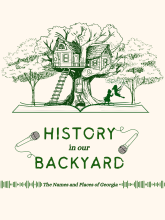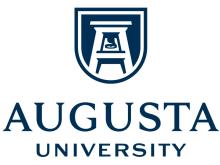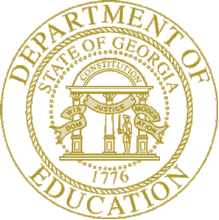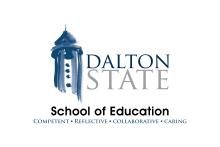
ER# 238 Contact: Irene Sanders
The History in our Backyard: The Names and Places of Georgia Podcast is an inquiry project where high school students in Student Leadership North conducted local history research about names of places in Georgia. Students analyzed primary sources using the Library of Congress’ archive and Teaching with Primary Sources strategies to write and record show notes with conversations about why local histories are important to understanding the meaning of place and civic identity. This grant funded the inaugural season of this podcast with five episodes about William Hartsfield and Maynard Jackson (Atlanta Hartsfield-Jackson Airport), Lake Lanier, Chickamauga, and Tallulah Falls.

Georgia Southern University
ER# 232 Contact: Ariel Cornett
The Place Based Partnering: Georgia’s Histories, Stories, and Languages project aims to design systematic strategies to curate Georgia histories, stories, and languages with youth and communities. We will organize and co-lead a 2024 summer institute, at Georgia Southern University in Savannah, for an initial cohort of Georgia community members including teacher educators, educational researchers, librarians, leaders, and K-12 teachers committed to place-based education and interdisciplinary, inquiry-based pedagogies. Additionally, we will facilitate multiple place-based summer 2025 projects at various Georgia sites to root our work in particular geographic, cultural, historic, and linguistic contexts. We intend to support Georgia educators, researchers, and community members in critically encountering and curricularizing community and archival resources within Georgia classrooms and communities. Our aim is to identify and/or create these resources in order to archive them as open access for this and future generations.

Georgia Historical Society
ER# 218 Contact: Elyse Butler
The Teaching with the Georgia Historical Marker Program self-paced course from the Georgia Historical Society (GHS) expands upon a previous TPS project, Teaching the Civil Rights Movement with the Georgia Historical Marker Program. This project makes available new and enhanced course materials, instructional videos, and primary source content within a dedicated online training platform that enables registrants to work through this popular training course content methodically and at their own pace. This course will teach participants to analyze markers, connect them to Georgia and American history through primary sources, and how to locate primary source collections from GHS, the Library of Congress, and other archival institutions. Participants will be introduced to the breadth of the Georgia Historical Marker Program, a freely available, valuable resource for classroom teaching and self-directed study as roadside historical markers may be found in every county across Georgia. Markers highlight local stories that serve as case studies to better understand topics spanning political, social, cultural, and economic themes in American history that directly align to Georgia’s educational standards. They also present opportunities for students to critically examine historical texts as written, discuss historical context and interpretation, engage in comprehensive historical inquiry exercises with primary sources, and practice writing and editing skills through drafting revised and generating original texts. This course will also explore the differences between historical markers and memorials or monuments as this distinction helps shape learners’ historical literacy skills to read and analyze cultural landscapes that can often include a combination of historical markers, statutes, monuments, and memorials in geographically corresponding spaces.
Award for Excellence in the Educational Use of Historical Record

Mercer University
ER# 205 Contact: Katherine Perrotta
The Same Storm, Different Boats: Documenting the Living History of the COVID-19 Pandemic project is a curriculum designed to engage high school students in the process of historical empathy through local history research about the impact of the COVID-19 pandemic. Students conduct primary source research about the pandemic using the growing archive of the Library of Congress to 1) explain the historical contexts of when the pandemic began, 2) examine the diverse experiences of people throughout the United States and the world during the pandemic, and 3) make reasoned affective connections to their own experiences living through the pandemic. Students will use analysis strategies provided by Teaching with Primary Sources in order to collect and curate original primary sources from their community to display as an exhibit as a means of taking informed action.
Student Leadership Johns Creek: Same Storm Different Boats
Article: "Promoting historical empathy with a local history research project about the pandemic"

Augusta University
ER #203 Contact: Juan Walker
Community Assets in Support of Teaching and Learning: Celebrating the Golden Blocks through Multigenre Texts supports literacy and content-area instruction for K-5 students and preservice teachers learning to teach in Augusta, GA schools. The goals of this project are to (a) research, (b) design, and (c) develop an asset-focused, culturally relevant resource. A secondary goal is to incorporate the Golden Blocks into teacher education coursework throughout the three semesters of teacher preparation coursework required by our elementary education program and to continue to provide professional development and build partnerships in the state of Georgia that support the larger goals of the Teaching with Primary Sources Program.
Cummings Science and Technology
ER #185 Contact: Sophia Cummings
The Science In Our World project includes a combination of summer camps and afterschool programs that offers high-quality programs to enhance student exposure to science, technology, engineering, and math (STEM) topics and careers. The program is presented to students in the Frank Callen Boys & Girls Clubs of Savannah, Georgia, as well as to the Fairfax County, Virginia high school students through a virtual program. While infusing STEM examples from research and applications to real world situations, students learn that STEM is everywhere in their world. Teaching with Primary Sources (TPS) is a viable resource used to promote this much-needed collaboration between schools and community organizations. The project builds awareness of the Library of Congress STEM education resources and uses the Library’s digitized primary sources to engage students, develops their critical thinking skills, and builds knowledge of STEM careers.

University of West Georgia
ER #181 Contact: Arren Swift
In Escaping Dull and Bookish: Enhancing Social Studies with Primary Sources, educators participate in professional development that features thirteen hands-on methods to help students engage and analyze images. Including the exploring the use of games, collaborative learning opportunities, and arts-based methods to increase student engagement. Then participants apply those strategies to the development of escape games to enhance the curriculum in their classes. Educators explore the resources of the Library of Congress and TPS Network to identify primary and secondary sources that can enhance student learning. This project promotes the use of images and active learning strategies to help create more engaged and informed citizens.

Georgia Historical Society
ER #179 Contact: Lisa Landers
The teacher training course from the Georgia Historical Society (GHS) titled, Teaching the Civil Rights Movement with the Georgia Historical Marker Program, equips pairs of elementary level educators to better teach Georgia and American history by utilizing the informational texts of the Georgia Historical Marker Program, promoting increased use of primary sources from GHS and the Library Congress, and disseminating effective inquiry-based strategies from TPS Consortium Members.
The ten week course guides participants to create lessons based on the Inquiry Design Model using primary sources to explore the Civil Rights Trail in the Georgia Historical Marker Program so students can better understand the struggle, impact, and nuance of the Civil Rights Movement in Georgia and the United States.

Fulton County Public Schools
ER #166 Contact: Jena Sibille
Through Cultivating Curiosity: Engaging Students with Primary Sources through Arts Integration professional teaching artists (TAs) and expert fifth grade teachers/specialists (art & music teachers and media specialists) collaborate to create five teacher-led, cross-curricular model units for 5th grade. These units provide exemplar lessons and activities to authentically engage students with primary sources and arts integration strategies. By incorporating close reading of primary sources and expression through the arts, teachers can increase the engagement and rigor in their classrooms while supporting literacy.

Fulton County Public Schools
ER #147 Contact: Jena Sibille
Enriching Learning through Authentic Inquiry and Primary Sources: Creating Model Units for 8th Grade Georgia Studies is a model for Georgia educators and students in integrating teaching with primary sources as a core approach to teaching Social Studies. Closely aligned with Fulton County Schools’ new strategic plan, the goals of this partnership are to enhance teachers’ knowledge of Georgia history so they can develop model units to support the Georgia Standards for Excellence for 8th grade Social Studies.
Fulton County Schools personnel serve as lead instructors during the seminar to introduce digital primary sources and model strategies from the Library of Congress. Dr. Jeffrey Robert Young, Principal Senior Lecture of History at Georgia State University, serves as the lead historian, making connections between primary sources and historical content and providing expert feedback on the model units that are created. Sue VerHoef, Director of Oral History and Genealogy from the Atlanta History Center; Nicole A. Moore, Manager of Education and Museum Content from the National Center for Civil and Human Rights, and Kate McLeod, Head of School and Teacher Services with the High Museum of Art, collaborate to provide compelling primary sources from their collections to enrich the model units developed. This project assists collaborating partners in extending their reach by raising teacher awareness of the rich primary sources that are available locally.
Fulton Teachers Use Original Documents To Create History Lessons
Fulton County Schools Online Archive Collection
Curiosity Corner Online Publications

Augusta University
ER #123 Contact: Juan Walker
Theoretical Cognitive Principles Applied in the Social Studies Classroom: Procedure of Primary and Secondary Sources in Conjunction with Critical Thinking Skills - The researcher has produced collections of Library of Congress primary and secondary sources for utilization in educational activities designed to develop critical thinking skills of pre-service social studies teachers, empowering them to pass on those skills to their students. The collections and activities are available on Desire2Learn, and a website repository is provided. Textbooks arel no longer be used as material in social studies methods course, and pre-service teachers are encouraged to use primary sources over the standard textbook materials.
Augusta University Web Resources for Teachers

Middle Georgia State University
ER #120 Contact: Elise Langan
Increasing Pre-service Teachers' Ability to Find and Integrate Standards-based Primary Source Instruction in the Secondary Social Studies Classroom - This project is a collaborative instructional effort between a Middle Georgia State College (MGSC) education faculty member, an Instructional Technology faculty member at MGSC, and a TPS Eastern Region Program educator. The pre-service teachers were students in a Social Studies Methods class. As part of the course, the students participated as a group in five one-hour TPS Level 1 webinars facilitated by the TPS Eastern Region Program staff. They also completed the Library of Congress online professional development modules individually and incorporated primary sources into lesson plans for their required field-experience classroom.

Hickory Hill
ER #115 Contact: Michelle Zupan
The Georgia History Project provides face-to-face multi-session professional development workshops for teachers. These workshops support participants in implementing primary source-based classroom learning activities. Digitized collections of primary sources from the Library of Congress are featured, supplemented by sources from the Vanishing Georgia Collection. Inquiry-based learning is emphasized, as well as reading across the curriculum. Participants are prepared to create meaningful Georgia Performance-aligned learning experiences featuring relevant digitized primary sources from both state and national collections.
Myth versus reality – what really happened at Plymouth? - Professional development activity created by Michelle Zupan designed for lower level grades K-2 through secondary level grades 9-12.

Clayton State University
ER #112 Contact: Charles Elfer
Teaching with Primary Sources: A Summer Academy for Historical Study is guided by the rationale that deeper and more purposeful partnerships between the K-12 community, colleges and universities, and public outlets charged with the preservation and dissemination of history will serve to promote and enhance our collective understanding of the past at all levels. Hosted by Clayton State University, and a joint effort between the Departments of Humanities and Teacher Education, the aim of this project is to promote history and history education through (a) a deepening of content area expertise and (b) a renewed awareness of historical thinking as an exercise in inquiry. Related to these complimentary objectives, our goal is to enhance teacher participants' abilities to locate and navigate archival materials, through both physical and online collections, and to assist teachers in the Atlanta metropolitan area in translating those skills and habits into their classrooms.
The Summer Academy focuses on an annual theme—initially, "Revolutions in History," generally following the annual National History Day theme in support of the Clayton State University's existing NHD programming. Participants in the three-day Academy enjoy content instruction from university historians on world and U.S. topics related to the annual theme and relevant to the CCGPS. Participants also take part in pedagogy seminars to facilitate the development of inquiry-based lesson ideas which utilize the historical materials maintained by the Library of Congress, the National Archives at Atlanta, and the State Archives of Georgia.

Georgia State University
ER #98 Contact: Chantee Earl
Examining the Civil Rights Movement with a Historian's Eye: A Professional Development Series for Teachers on Using Historical Analysis of Landmarks, Primary Source Documents, and Artifacts in Classroom Instruction - This professional development series exposes English Language Arts and Social Studies teachers to instructional strategies that foster and promote critical literacy and historical thinking, increase content knowledge, and address the Common Core Georgia Performance Standards (CCGPS) for Literacy in the Social Studies and the Georgia Performance Standards (GPS) in English Language Arts and Social Studies.
The goals are to (1) impact teachers' understanding of critical literacy, historical analysis, and inquiry, and to (2) enhance student engagement, mastery of content knowledge, and critical thinking skills related to the study of the events, persons, and impact of Georgia on the national Civil Rights Movement past and present. By visiting local and regional historical landmarks and working with primary source documents from the Library of Congress website, teacher participants assume the role of "true historian." As historians, teachers interrogate a variety of primary sources to obtain multiple perspectives of the historical narrative. In addition, they examine the significance, context meaning, and relationship of artifacts and primary source documents to develop interpretations of the national Civil Rights Movement.

Augusta University
ER #87 Contact: Juan Walker
Theoretical Cognitive Principles Applied in a Social Studies Classroom provides authentic materials for students to practice the skills required by the Common Core State Standards (CCSS). Project leaders assemble topical groupings of digitized materials available through the Library of Congress web site, including photographs, newspapers, films, audio files, government documents, personal correspondence, and economic data. Assemblages are posted to a project website for use by pre-service teachers during methods courses and student teaching. These resources are maintained as an open source for other pre- and in-service teachers who may wish to strengthen their own critical thinking skills or develop their own activities intended to build their students' critical thinking skills.
Unlocking your Inner Sherlock: Inquiry Learning with Primary Sources

Columbus State University
ER #66 Contact: Victor Salazar
The Cultural Approach to History Project is designed to provide a professional development opportunity for in-service and pre-service social studies and history teachers from schools in the bi-state areas of West Georgia and East Alabama. Primary sources are integrated into this multidisciplinary approach to teaching lessons based on State of Georgia's Performance Standards. The two venues wherein the use of primary sources are a seminar include Columbus, GA and a field seminar at the historic battlefield of Gettysburg, PA.

Georgia Historical Society
ER #65 Contact: Christy Crisp
The Georgia Historical Society's (GHS) Opening America's Archives: Using Primary Sources Across Disciplines teacher-training initiative supports eight-grade Social Studies and English Language Arts pre-service and in-service teachers as they align core course content within Georgia Performance Standards to national Common Core Standards. GHS trains 125 teachers through delivery of five statewide teacher-training workshops, in each of the following Georgia Department of Education RESA Districts: North Georgia (2), Metro (4), Middle Georgia (8), First District (13), and Southwest Georgia (14). Workshops introduce teachers to the library and archival collections of the Library of Congress, the Georgia Historical Society, as well as other relevant repositories across Georgia while equipping them with tips, tools, and techniques for engaging students in exploration and study of primary sources and informational texts in the classroom. GHS created an online presence for the project that serves as an enduring educational resource and portal to workshop content, including sample curricular units, links to relevant repositories and online resources, and lesson plans created by teacher-participants to expand the reach of this important initiative.
Project Website
Georgia History Today News Magazine - Spring/Summer 2019 Volume 13 #1

Georgia Department of Education
ER #26 Contact: Shaun Owen
Georgia Department of Education Teaching with Primary Sources participates with four other states as part of the Social Studies Assessment, Curriculum, and Instruction collaborative under the Council of Chief State School Officers, developing a pool of teachers and resources to improve instruction in United States History through the use of primary sources. The project also aligns with the Common Core State Standards (CCSS) Literacy for History/Social Studies. Approximately 100 teachers were trained in Georgia at four different workshops. These workshops are held in four different regions in Georgia: metropolitan Atlanta, suburban Atlanta, a moderately rural area in central Georgia, and rural Southwestern Georgia.

Dalton State College
ER #23 Contact: Joshuah Pfiester
Opening Pandora's Box: Preparing Preservice Teachers to Use Primary Sources and Inquiry through a Collaborative Partnership - The phrase Pandora's Box conjures countless images based on one's experiences with Greek mythology. The Opening Pandora's Box project plays on this myth to envision a group of educators collaboratively "opening the Box" to unlock the positive power of primary sources and inquiry learning for public school students. Independent public school teachers, college professors, and media specialists complete primary sources and inquiry professional development. Next, they meet to discuss their training and build common knowledge. Then, based on shared training, the educators develop inquiry topics and create kits to promote student inquiry social studies learning. Lastly, they implement inquiry learning activities through the use of materials they have created and primary sources from the Library of Congress and other sources. Opening Pandora's Box benefits both public school students and pre-service teachers.
Sample STEM Lesson Plan by Joshuah Pfiester: Caissons and Cofferdams